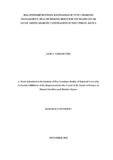| dc.description.abstract | Diabetes is a chronic metabolic condition associated with the highest co-morbidities and
complications affecting people of diverse social-economic status. Even though diabetes
is considered a manageable condition-by regulating blood sugar levels using medication
or through the diet, having nutrition education and going for frequent checkups- the rates
of mortality are still alarming. It is estimated that 1.5 million people succumbed to it or
its related complication worldwide in 2013 alone. This scenario necessitates the need to
determine how bloods sugar levels- an indicator of diabetes- is regulated as well as the
health seeking behavior at an individual level. Furthermore, the need is greater in a
nomadic population because of their unique lifestyle. Therefore, the purpose of this
study is to determine the relationship between knowledge of Type 2 Diabetes (T2D)
management, health seeking behavior and blood sugar levels among diabetic
pastoralists. This study was conducted at Kapenguria Referral Hospital in West Pokot.
The study employed cross-sectional descriptive research design and 79 participants who
met the inclusion criteria were consented and recruited into the study using simple
random sampling. Data was collected using a pre-tested self-administered questionnaire.
Data was analyzed in 3 phases. Phase 1was analyzed using descriptive statistical and
presented as numbers and proportions. Phase 2: Pearson‘s chi square test was used to
determine the difference between knowledge of T2Dmanagement categories, Health
seeking behavior categories and blood sugar levels. In the last phase, logistic regression
was used to determine the relationship between knowledge of T2D management, health
seeking behavior and blood glucose levels. Odds ratio and the 95%CI were presented at
an alpha of 0.1. Among the 79 participants, 75.9% reported nutrition knowledge and
regular physical exercises, 84.8% had the knowledge on foot care-that cutting toe nails
should be done carefully and 63.3% did not keep the clinic appointments. Even with
high knowledge on diabetes management high blood sugar levels were presented. The
findings showed that those participants with high knowledge on dietary and on
symptoms and complication were less likely to have blood sugar levels higher than 7.2
mmol/L with an odd of 0.31 (0.08, 1.26) and 0.23 (0.06, 1.36) respectively. In addition,
the health seeking behavior of participants who had at least an annual checkup were less
likely to have blood glucose levels higher than 7.2mmol/l at pvalue ≤ 0.05. Keeping
clinic appointment helps improves the blood sugar levels hence the management and
control of T2D. Having the knowledge on symptoms and the complications of diabetes
is equally important since they reflect on whether the blood glucose levels are regulated
or not. This study therefore, recommends that more sensitizationon the strategies of
managing T2D as well as the importance of keeping clinical appointments in a nomadic
population. | en_US |

